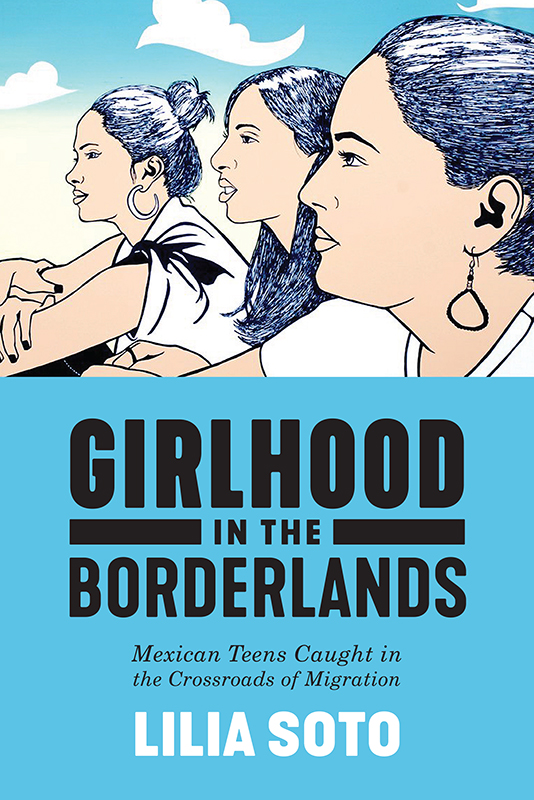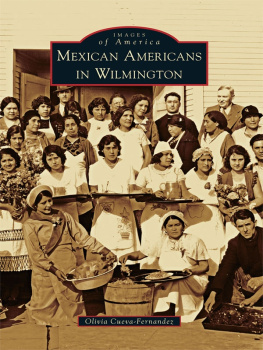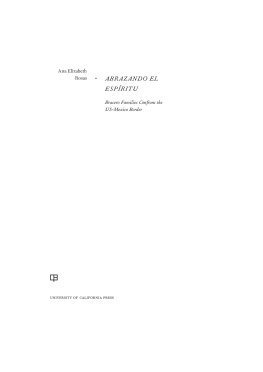
Girlhood in the Borderlands
NATION OF NATIONS: Immigrant History as American History
General Editor: Matthew Jacobson
Founding Editors: Matthew Jacobson and Werner Sollors
Beyond the Shadow of Camptown: Korean Military Brides in America
Ji-Yeon Yuh
Feeling Italian: The Art of Ethnicity in America
Thomas J. Ferraro
Constructing Black Selves: Caribbean American Narratives and the Second Generation
Lisa D. McGill
Transnational Adoption: A Cultural Economy of Race, Gender, and Kinship
Sara K. Dorow
Immigration and American Popular Culture: An Introduction
Jeffrey Melnick and Rachel Rubin
From Arrival to Incorporation: Migrants to the U.S. in a Global Era
Edited by Elliott R. Barkan, Hasia Diner, and Alan M. Kraut
Migrant Imaginaries: Latino Cultural Politics in the U.S.-Mexico Borderlands
Alicia Schmidt Camacho
The Force of Domesticity: Filipina Migrants and Globalization
Rhacel Salazar Parreas
Immigrant Rights in the Shadows of Citizenship
Edited by Rachel Ida Buff
Rough Writing: Ethnic Authorship in Theodore Roosevelts America
Aviva F. Taubenfeld
The Third Asiatic Invasion: Migration and Empire in Filipino America, 18981946
Rick Baldoz
Race for Citizenship: Black Orientalism and Asian Uplift from Pre-Emancipation to Neoliberal America
Helen Heran Jun
Entitled to Nothing: The Struggle for Immigrant Health Care in the Age of Welfare Reform
Lisa Sun-Hee Park
The Slums of Aspen: Immigrants vs. the Environment in Americas Eden
Lisa Sun-Hee Park and David Naguib Pellow
Arab America: Gender, Cultural Politics, and Activism
Nadine Naber
Social Death: Racialized Rightlessness and the Criminalization of the Unprotected
Lisa Marie Cacho
Love and Empire: Cybermarriage and Citizenship across the Americas
Felicity Amaya Schaeffer
Soft Soil, Black Grapes: The Birth of Italian Winemaking in California
Simone Cinotto
Citizens of Asian America: Democracy and Race during the Cold War
Cindy I-Fen Cheng
Global Families: A History of Asian International Adoption in America
Catherine Ceniza Choy
Whos Your Paddy?: Racial Expectations and the Struggle for Irish American Identity
Jennifer Nugent Duffy
Islam Is a Foreign Country: American Muslims and the Global Crisis of Authority
Zareena Grewal
African and American: West Africans in Post-Civil Rights America
Marilyn Halter and Violet M. Showers Johnson
From the Land of Shadows: War, Revolution, and the Making of the Cambodian Diaspora
Khatharya Um
The Cultural Politics of U.S. Immigration: Gender, Race, and Media
Leah Perry
Strange Fruit of the Black Pacific: Imperialisms Racial Justice and Its Fugitives
Vince Schleitwiler
Whiteness on the Border: Mapping the US Racial Imagination in Brown and White
Lee Bebout
The New Immigrant Whiteness: Neoliberalism, Race, and Post-Soviet Migration to the United States
Claudia Sadowski-Smith
Colonial Phantoms: Belonging and Refusal in the Dominican Americas, form the 19thCentury to the Present
Dixa Ramrez
Girlhood in the Borderlands: Mexican Teens Caught in the Crossroads of Migration
Lilia Soto
Girlhood in the Borderlands
Mexican Teens Caught in the Crossroads of Migration
Lilia Soto

NEW YORK UNIVERSITY PRESS
New York
NEW YORK UNIVERSITY PRESS
New York
www.nyupress.org
2018 by New York University
All rights reserved
References to Internet websites (URLs) were accurate at the time of writing. Neither the author nor New York University Press is responsible for URLs that may have expired or changed since the manuscript was prepared.
Library of Congress Cataloging-in-Publication Data
Names: Soto, Lilia, author.
Title: Girlhood in the borderlands : Mexican teens caught in the crossroads of migration / Lilia Soto.
Description: New York : New York University Press, [2018] | Includes bibliographical references and index.
Identifiers: LCCN 2017045036 | ISBN 9781479838400 (cl : alk. paper) | ISBN 9781479862016 (pb : alk. paper)
Subjects: LCSH : Teenage girlsMexico. | Teenage immigrantsUnited States. | Transnationalism. | MexicoEmigration and immigrationSocial aspects. | United StatesEmigration and immigrationSocial aspects.
Classification: LCC HQ799.M6 S68 2018 | DDC 305.235/20972dc23
LC record available at https://lccn.loc.gov/2017045036
New York University Press books are printed on acid-free paper, and their binding materials are chosen for strength and durability. We strive to use environmentally responsible suppliers and materials to the greatest extent possible in publishing our books.
Manufactured in the United States of America
10 9 8 7 6 5 4 3 2 1
Also available as an ebook
To my parents, Matias and Maria Elena Soto, gracias por todo. Soy por ustedes.
To my sisterslas chiquillasLupe, Olivia, Silvia, Martha and Lorena, thank you for being with me.
To my nephew Jiulian, I welcome you back.
To my niece Sofia, thank you for being so lovely.
To my nephew Eztli, my chiquilinguis, I love you to the moon and back.
To my sobrino-nieto Jay, thank you for brightening our lives.
Contents
I have moved this project forward by looking backwards. I began this research in the early 2000s looking back on my childhood experiences of migrating to the United States in the 1980s. I decided to conduct a multi-site research project in the U.S. and Mexico focused on young im/migrant women to see if contemporary migrant girls had the same aspirations, anxieties, expectations, and experiences that I had had. My father had made repeated trips back and forth between Zinapcuaro, Michoacn, and Napa, California, before he settled in the United States permanently. My mother and siblings remained in Mexico where we anticipated moving north someday. Fragmentation and transnationalism defined our family life. It was fragmented by moves to the U.S. and back to Mexico, and then to the U.S. once again, and by visits, phone calls, letters, and other efforts to share affection and intimacy with family members living in two different countries. We did not simply move from our country of origin to our country of arrival, but lived physically and psychically inside and across national borders, simultaneously and sequentially.
I was born in Napa and raised in Zinapcuaro until the fourth grade. After living in a transnational family for ten years, my mother, five sisters, and I reunited with my father. I know Zinapcuaro and Napa very well, and have witnessed how migration, globalization, and the flow of transnational products have altered both locations. In this study, my insiders perspective allows me to have an intimate and personal understanding of girls lives and place in which they live, yet my training as a researcher enables an analytic and impersonal understanding of social structures and social forces. I can view my objects of research both from close up and from far away. Over the years, I have witnessed how the city of Napa has grown to cater to its tourist industry and wine economy, while my annual trips back to Zinapcuaro allowed me to trace the changes in the town that were due to the national and transnational dimensions of its diaspora caused by new international trade policies and neoliberal restricting of the social wage. Having lived in the U.S. since 1986, I am no longer considered an immigrant, which removes me from the immediate immigrant experience. Still, I am able to ask interviewees about details I may have otherwise missed if I were a complete outsider, such as the importance of schooling, afterschool activities, and family life. Unlike most of the girls I interviewed, I was privileged enough to have been born in the U.S., allowing me to move legally within and across transnational social fields. Such privilege and mobility places me as a member outside of the immediate migrant community. I try to make the best of my contradictory and ambiguous identitiesto negotiate my positionalityby listening to the girls, by not interrupting them or inserting myself in their interviews. Once I pressed the stop button to cease recording, the girls invariably asked me questions about me and my relationship to migration. During these moments, I usually revealed my story and shared why this project matters, why their stories need to be heard.
Next page






